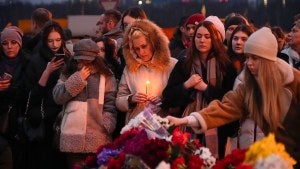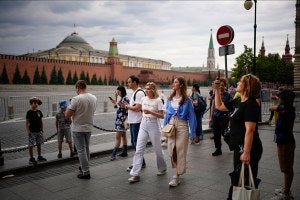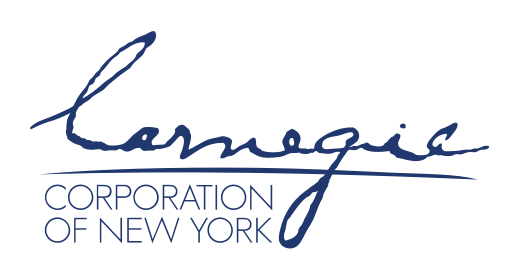Russian young adults have a more positive economic and political outlook than their American counterparts, yet both youth populations think equally about emigrating.
Chicago Council on Global Affairs and Levada Analytical Center surveys find that 18- to 34-year-old Russians view the future of Russia’s political and economic situation more positively than young Americans view the same in the United States. The data additionally show that context, nationalism, and governmental preferences play a significant role in shaping future outlooks among both youth populations.
Key Findings
- Four in 10 Russian young adults (38%) express optimism (25%) or excitement (13%) when thinking about Russia’s future economic situation, compared to just two in 10 Americans (18%) of the same age (16% optimistic, 2% excited).
- At the same time, 42 percent of Russian young adults say they feel anxious (32%) or pessimistic (10%) about the future economic situation in their country, compared to nearly six in 10 young Americans (57% total, 30% anxiety, 27% pessimism).
- When it comes to their countries’ future political situations, 36 percent of young Russians are optimistic (22%) or excited (14%), compared to less than one in 10 American young adults (8% total, 7% optimistic, 1% excited).
- Four in 10 (41%) young Russians say they feel anxious (32%) or pessimistic (9%) about Russia’s future political situation, compared to seven in 10 young Americans (71% in total, 32% anxious and 39% pessimistic).
- A strong majority of Russian youth (82%) say they are very (65%) or somewhat proud (17%) to be Russian citizens, while less than half of American youth (43%) say they are very (22%) or somewhat (21%) proud to be American citizens.
- Three in 10 Russian and American young adults (30% and 31%, respectively) have thought about emigrating and cite their economic and political situations, as well as the perceived higher quality of life abroad, as reasons why.
Young Russians View Their Economic Futures More Positively Than Young Americans
Despite negative initial economic forecasts and continued efforts by the United States and other Western nations to cripple the Russian economy, Russian President Vladimir Putin’s wartime economy seems to be weathering the storm. In fact, the International Monetary Fund expects Russia’s economy to grow faster than the world’s most advanced economies, including the United States, the United Kingdom, France, and Germany, this year. While the mass exodus of wartime migrants caused the Russian labor market to tighten, it also dramatically increased real wages across the military and other sectors of the economy and encouraged greater consumer spending. As a result, the Customer Sentiment Index, which is measured by the Levada Center and reflects customer confidence in economy and personal financial situation, nearly reached its peak last month.
The joint Council-Levada survey, fielded January 26 to February 26, 20241, finds that Russian young adults are of two minds when thinking about their economic situation in 10 years. While 42 percent of Russian youth express anxiety (32%) or pessimism (10%), nearly as many (38%) say they feel optimistic (25%) or excited (13%). One reason for that excitement: almost half of Russian young adults think career and salary opportunities are increasing (47%), while roughly equal shares say they have stayed the same (24%) or decreased (22%) in the last five years.
While economic growth in the United States is expected to slow this year, economic experts do not foresee a recession on the horizon and instead report low levels of unemployment, record high stock indices, a rising Gross Domestic Product, and slowing rate of inflation. Still, the stubbornly high prices of goods and services continue to frustrate American consumers and seem to elicit a bleak economic outlook among the youth population.
Despite these positive indicators, half of young Americans (52%) think career prospects in the United States are worse today than they were five years ago, and only two in 10 young Americans (18%) think their employment opportunities are better.
When thinking about the US economy in 10 years, the majority of young Americans are either anxious (30%) or pessimistic (27%). As compared to their Russian counterparts, this youth population is far less positive about their economic future, as less than two in 10 reports feeling optimistic (16%) or excited (2%) about it.
Russian Young Adults Also Have a More Positive Political Outlook Than American Young Adults
As Russia’s military operation in Ukraine continues, the question of what is to follow remains at the forefront of many minds. In Russia, similar shares of young adults express both negative and positive emotions when thinking about their country’s political future (41% negative, 36% positive, 9% indifferent). Despite feeling slightly more anxious (32%) or pessimistic (9%) than optimistic (22%) or excited (14%), young Russians have a much more positive outlook toward the future of Russia’s political situation than Americans have toward theirs.
Young Americans paint a much bleaker picture of American politics in 10 years, as seven in 10 respondents (71%) say they feel either anxious (32%) or pessimistic (39%) toward it. They are far more pessimistic (39% American vs. 9% Russian) and are far less optimistic (7% American vs. 22% Russian) or excited (1% American, 14% Russian) about their political future than their Russian counterparts.
Experts contend that the United States has experienced significant democratic backsliding in recent years. In the 2023 Chicago Council Survey , majorities of Americans 18 to 34 also saw weakening democracy (58%) and political polarization (54%) as critical threats to the vital interests of the United States in the next 10 years (see appendix table 1).
For a youth population that prefers democracy over any other kind of governance system (61%), their negative political outlook is likely due, in part, to such perceptions of democratic erosion and polarization. However, it is important to note that almost a fourth of American young adults say they do not know what sort of government they would prefer (24%).
Further data analysis confirms that both Russian and American young adults are more likely to have a negative political outlook if they prefer a democratic system compared to those more amenable to authoritarian systems or those who are indifferent (see appendix tables 2 and 3). However, the preference for democracy has a greater effect on anxiety and pessimism toward the future among young Russians than young Americans.
Almost half of Russian young adults say they prefer democracy over any other kind of government (48%), but only slightly less (41%) either think an authoritarian government can be preferable to a democratic one in some circumstances (20%) or that the regime does not matter to people like them (21%). One in 10 young Russians find it difficult to say what system of government they prefer (11%).
Taken together, these data suggest that, compared to American young adults, young Russians have a more positive political outlook because a substantial share think authoritarian governments are preferable in some circumstances or that it does not make a difference to them either way.
Putin often refers to Russia as being a besieged fortress to bolster both support for the special military operation in Ukraine and a highly centralized government. Despite such rhetoric, the plurality of young Russians is more concerned about threats within Russia (43%) than threats beyond its borders (26%). However, the data show those most concerned with external threats are almost twice as likely to say that authoritarian regimes can be preferable under certain circumstances (29%) than those most concerned about internal threats (16%). They are also more likely to be apathetic about their governance system and think that it does not matter to them (24%) than those who consider domestic issues a greater threat (17%).
Young Russians may be more likely to desire a strong, consolidated government in a time of war or when external threats loom because such provides the domestic stability and decisive leadership necessary to protect national security and achieve victory. Since the United States is not directly involved in any current conflicts and faces only minor external national security threats, a much smaller share of young Americans reports being more concerned about external threats (16%), comparatively.
Young Russians Express More Nationalistic Sentiments Than Young Americans
Russian young adults are often described as being part of the “Putin Generation” of apolitical yet very patriotic citizens who have come of age during Putin’s 25 years in power. Together, a cultural emphasis on national pride, regulated media landscape, and patriotic educational curricula have created a robust sense of national identity among the youth. Thus, more than eight in 10 (82%) say they are very proud (65%) or somewhat proud (17%) to be Russian citizens.
On the other hand, a strong culture of dissent and stark sociopolitical divisions in the United States contribute to more tepid patriotism among young Americans. Less than half of American young adults (43%) say they are very (22%) or somewhat (21%) proud to be American citizens, and on a five-point scale, with one being not proud at all and five being very proud, a plurality of American youth (33%) place themselves squarely in the middle.
When it comes to national exceptionalism, young Russians are also more likely to assert Russia’s superiority than Americans are to assert that of the United States. A slim majority of Russian youth say their population is of particular significance to world history (52%), while less than half say they are a people like any other (45%). Young Russians who claim authoritarian rule as preferable to democratic are more likely to believe in Russia’s exceptionalism than those who prefer democratic systems (64% vs. 46%).
By contrast, the majority of Americans 18 to 34 said the United States is no greater than other nations (64%) in the 2023 Chicago Council Survey. However, a third contended that the United States is the greatest country in the world (35%).
Among Russians and Americans, data analysis suggests that patriotic youth have more positive political and economic outlooks than those with less national pride. Young Russians and Americans who say they are very or somewhat proud to be Russian or American citizens are more likely than others to express optimism or excitement (and less likely to express anxiety or pessimism) when thinking about their future economic and political situations (see appendix tables 4–7). The more positive political and economic outlook among young Russians may thus be associated with their high level of patriotism. Young Americans, on the other hand, express far less national pride and, perhaps as a result, view the future of the American economy and politics through a much more critical and pessimistic lens.
A Third of Young Russians and Americans Have Thought about Emigrating
With tepid patriotism and a bleak view of the future, three in 10 American young adults say they have thought about emigrating (31%). Among those who have considered emigration, a plurality (42%) cites either the political (27%) or economic situation (15%) in the United States as a push factor (42%), but nearly as many say they have thought about emigrating because they perceive the quality of life as higher abroad (38%).
Although at a similar level to those of American youth, Russian sentiments toward emigration are far more complex and contextual. In a survey among the overall Russian public in February 2022, ahead of the special military operation in Ukraine, 19 percent of the overall Russian population wanted to emigrate. However, the share of those that wanted to emigrate declined by 10 percentage points a month later and has, since, remained at that level. This sharp and sudden decline—experienced across all age cohorts, but especially among the youth population—likely reflects the exodus of more than 800,000 wartime migrants who fled the country within days of military operation’s launch, including economic migrants, conscientious objectors, and political refugees.
However, difficulties obtaining employment, renewing residencies, and assimilating have led thousands of wartime migrants to return to Russia. Rising incomes, improving standards of living, and a seemingly stable political situation have also led many of those who considered emigration in the past to forgo this option, even if they have the financial or legal means to leave.
Today, the Chicago Council-Levada Center survey finds that three in 10 young Russian adults have thought about emigrating at some point in their lives (30%) and likely represent those who had plans to leave but were unable to as a result of financial, political, or logistical constraints. They may also represent a segment of young adults who are interested in living abroad and experiencing life outside of Russia.
Provided the opportunity to select multiple reasons why they consider emigrating, many young Russians cite the political (42%) and economic (40%) situations in Russia, the perceived higher quality of life (39%) and education (22%) abroad, perceived better business conditions abroad (17%), and fears of conscription (16%).
Conclusion
Americans and Russians are often cast as polar opposites, positioned at either ends of the political and cultural spectra. Data from Chicago Council-Levada Center surveys do show differences in nationalism, governmental preferences, and political culture across Russian and American youth populations; when taken together, these factors contribute to their very nuanced economic and political outlooks. For young Americans, tepid nationalism, a strong preference for democratic systems, and concerns over democratic backsliding have led them to see a bleak political and economic future for themselves. On the other hand, a stronger sense of national pride, greater political apathy and amenability to authoritarianism, and belief that their country has persevered in the face of Western sanctions have led young Russians to remain confident in their political and economic futures. However, despite their differences, the survey also finds that both youth populations share similar anxieties and equally think about emigrating for a higher quality of life, better education, and more economic opportunities.
- 1
The US survey was fielded January 26–28, 2024, while the Russian survey was fielded February 6–26, 2024. Please see the methodology section for more information on the survey methods, fielding, and sample.
Table 1. Critical Threats across Age Cohorts
Below is a list of possible threats to the vital interest of the United States over the next 10 years. For each one, please select whether you see this as a critical threat, an important but not critical threat, or not an important threat at all: (%)
| 18-34 | 35-49 | 50-64 | 65+ | All | |
|---|---|---|---|---|---|
| Large numbers of immigrants and refugees coming into the US | 28 | 34 | 50 | 55 | 42 |
| Climate change | 60 | 52 | 43 | 50 | 52 |
| International terrorism | 42 | 46 | 58 | 60 | 52 |
| The military power of Russia | 41 | 42 | 50 | 52 | 46 |
| North Korea's nuclear program | 42 | 45 | 64 | 59 | 52 |
| Iran's nuclear program | 36 | 44 | 57 | 59 | 49 |
| A global economic downturn | 60 | 55 | 54 | 48 | 54 |
| Weakening democracy in the United States | 58 | 64 | 73 | 83 | 69 |
| The development of China as a world power | 42 | 52 | 65 | 73 | 58 |
| Political polarization in the United States | 54 | 53 | 63 | 74 | 61 |
| Cyber-attacks on US computer networks | 61 | 66 | 83 | 82 | 72 |
Table 2. Political Outlook among Young Americans
When you think of the United States' political situation in 10 years, which of the following best describes how you feel? (%)
| Democracy is preferable to any other kind of government | Under some circumstances, an authoritarian government can be preferable to a democratic one | For people like me, it does not matter whether we have a democratic or non-democratic regime | I don't Know | All | |
|---|---|---|---|---|---|
| Refused | 0 | 1 | 2 | 4 | 4 |
| Optimistic | 7 | 8 | 7 | 8 | 7 |
| Pessimistic | 46 | 41 | 41 | 25 | 39 |
| Anxious | 36 | 27 | 30 | 26 | 32 |
| Indifferent | 8 | 11 | 12 | 15 | 10 |
| Excited | 0 | 10 | 3 | 1 | 1 |
| Something else | 1 | 0 | 1 | 2 | 1 |
| None of the above | 2 | 1 | 4 | 20 | 7 |
Table 3. Political Outlook among Young Russians
When you think of the Russia's political situation in 10 years, which of the following best describes how you feel? (%)
| Democracy is preferable to any other kind of government | Under some circumstances, an authoritarian government can be preferable to a democratic one | For people like me, it does not matter whether we have a democratic or non-democratic regime | I don't Know | All | |
|---|---|---|---|---|---|
| Optimistic | 21 | 28 | 21 | 21 | 22 |
| Pessimistic | 14 | 4 | 6 | 3 | 9 |
| Anxious | 39 | 29 | 22 | 22 | 32 |
| Indifferent | 7 | 6 | 14 | 14 | 9 |
| Excited | 10 | 23 | 14 | 18 | 14 |
| Something else | 1 | 0 | 1 | 0 | 1 |
| None of the above | 6 | 6 | 17 | 14 | 9 |
| Difficult to answer | 1 | 3 | 4 | 9 | 3 |
Table 4. Economic Outlook among Young Americans
When you think of the United States' economic situation in 10 years, which of the following best describes how you feel? (%)
| 1 - Not proud at all | 2 | 3 | 4 | 5 - Very proud | All | |
|---|---|---|---|---|---|---|
| Refused | 2 | 3 | 1 | 0 | 3 | 3 |
| Optimistic | 9 | 5 | 14 | 19 | 25 | 16 |
| Pessimistic | 38 | 34 | 26 | 25 | 24 | 27 |
| Anxious | 26 | 35 | 36 | 26 | 24 | 30 |
| Indifferent | 14 | 19 | 14 | 20 | 9 | 14 |
| Excited | 0 | 1 | 1 | 4 | 3 | 2 |
| Something else | 0 | 1 | 3 | 1 | 2 | 2 |
| None of the above | 10 | 3 | 6 | 5 | 10 | 6 |
Table 5. Economic Outlook among Young Russians
When you think of the Russia's economic situation in 10 years, which of the following best describes how you feel? (%)
| 1 - Not proud at all | 2 | 3 | 4 | 5 - Very proud | All | |
|---|---|---|---|---|---|---|
| Optimistic | 5 | 10 | 2 | 10 | 35 | 25 |
| Pessimistic | 22 | 34 | 26 | 15 | 5 | 10 |
| Anxious | 36 | 48 | 47 | 44 | 26 | 32 |
| Indifferent | 19 | 0 | 10 | 9 | 6 | 7 |
| Excited | 7 | 3 | 5 | 10 | 16 | 13 |
| Something else | 6 | 2 | 3 | 1 | 2 | 2 |
| None of the above | 6 | 3 | 6 | 8 | 8 | 8 |
| Difficult to answer | 0 | 0 | 2 | 3 | 3 | 3 |
Table 6. Political Outlook among Young Americans
When you think of the United States' political situation in 10 years, which of the following best describes how you feel? (%)
| 1 - Not proud at all | 2 | 3 | 4 | 5 - Very proud | All | |
|---|---|---|---|---|---|---|
| Refused | 2 | 3 | 2 | 0 | 2 | 4 |
| Optimistic | 6 | 2 | 6 | 7 | 12 | 7 |
| Pessimistic | 46 | 48 | 41 | 37 | 34 | 39 |
| Anxious | 31 | 35 | 34 | 36 | 26 | 32 |
| Indifferent | 3 | 8 | 11 | 12 | 10 | 10 |
| Excited | 1 | 0 | 1 | 2 | 3 | 1 |
| Something else | 0 | 1 | 1 | 1 | 2 | 1 |
| None of the above | 11 | 3 | 5 | 5 | 11 | 7 |
Table 7. Political Outlook among Young Russians
When you think of the Russia's political situation in 10 years, which of the following best describes how you feel? (%)
| 1 - Not proud at all | 2 | 3 | 4 | 5 - Very proud | All | |
|---|---|---|---|---|---|---|
| Optimistic | 12 | 6 | 1 | 8 | 31 | 22 |
| Pessimistic | 18 | 32 | 26 | 16 | 3 | 9 |
| Anxious | 27 | 54 | 43 | 39 | 27 | 32 |
| Indifferent | 16 | 6 | 13 | 10 | 8 | 9 |
| Excited | 4 | 0 | 8 | 15 | 17 | 14 |
| Something else | 2 | 2 | 1 | 2 | 1 | 1 |
| None of the above | 17 | 0 | 7 | 7 | 10 | 9 |
| Difficult to answer | 3 | 0 | 1 | 2 | 4 | 3 |
This Chicago Council on Global Affairs-Levada Analytical Center survey was conducted February 6–26, 2024, among a weighted national sample of 1,003 adults 18 to 34 living in Russia. This sample was obtained from a randomly generated sample of mobile phone numbers, which were used to contact respondents and survey them via a computer-assisted telephone interviewing method. The margin of error for the full sample is ± 3.1 percentage points at a 95 percent confidence interval.
The eligibility of respondents was verified based on their answers to questions about age and their region of residence. For the study, respondents 18 to 34 living in Russia were considered eligible to be surveyed.
The Chicago Council on Global Affairs-Ipsos survey was conducted January 26–28, 2024, by Ipsos using its large-scale, nationwide, online research panel, KnowledgePanel, among a weighted national sample of 1,694 adults 18 to 34 living in all 50 US states and the District of Columbia. The margin of error for the full sample is ± 2.4 percentage points but is higher for partisan or demographic subgroups.
The data for the total sample were weighted to adjust for gender, age, race and ethnicity, education, census region, metropolitan status, and household income using demographic benchmarks from the 2023 March Current Population Survey Supplemental Data.
This work is made possible by the generous support of the Carnegie Corporation of New York.








Related Content
 Public Opinion
Public Opinion
The Levada Analytical Center’s Stepan Goncharov joins Council Research Assistant Lama El Baz to explore recent survey findings.
 Public Opinion
Public Opinion
Although Russian young adults primarily turn to social media for news, a majority do not trust information reported by most media outlets.
 Public Opinion
Public Opinion
Although a plurality of young Russians say they are anxious about Russia’s political future, few vote or participate politically.
 Public Opinion
Public Opinion
Before the Crocus City Hall attack, a plurality of Russian young adults said Russia’s top foreign policy priority should be bolstering the country’s physical defenses.

